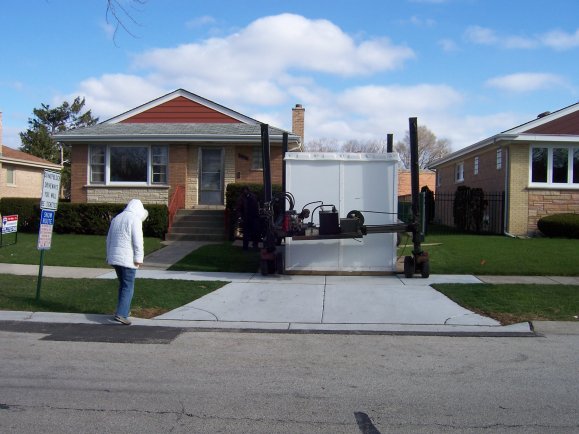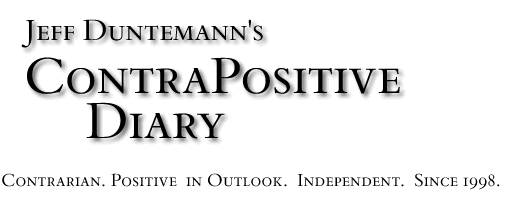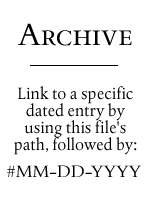|
|
|

|
 April
30, 2007: Where Have All the Funny Search Terms Gone? April
30, 2007: Where Have All the Funny Search Terms Gone?
Time was, I could read my Web stats at the end of every month and
get a good laugh out of them. But for some reason, it's been a dry
season on the search term front. See earlier entries here
and here.
I don't have much to hold up to that. Why? Why? I publish
more and more words every month and get more and more visitors;
you'd think the whackiness would increase. But alas, this is the
best I can do for April:
powered by gallery downblouse
-- Gallery Downblouse; wasn't he in Oliver Twist?
hydroponic diary layout
-- Please document how you plant your radishes.
mom nuds in bathroom
-- Mom quick call Terminex!
illinois ham radio feasts
2007 -- Chicken in cream sauce over a bed of resistors. Yum!
And April's were the best in several months. I guess as the world
gets crazier, the world searches saner. Or something.

|
 April
27, 2007: Get Constipated! Save the Planet! April
27, 2007: Get Constipated! Save the Planet!
In case you don't follow links in my Odd Lots entries (or if you've
been living under a box for the last few days) you may not have
heard that Sheryl Crow has proposed limiting
the number of sheets of toilet paper you use on each...um...sitting
in order to combat global warming. (Thanks to Brook Monroe for the
above stone-cold sober BBC link, though most other papers have carried
the story.) I almost immediately received several notes telling
me that it was indeed a hoax, or at least a joke. (One gentleman
said, "Jeff, can you spell i..r..o..n..y??" Yes I can,
at least when I detect any in the vicinity.) Rick Widmer sent me
the link to the
People article in which Laurie David (producer of Al
Gore's An Inconvenient Truth) said that it was a joke. And
if Laurie David said it, and People published it, how could
we possibly doubt it?
Heh. Can you spell d..a..m..a..g..e......c..o..n..t..r..o..l?
I can almost hear it: Psssst! Sheryl, you nitwit! You're playing
right into the hands of the enemy! Say it's a joke RIGHT NOW or
I'll tie you to a chair and make you watch the movie again!
I guess the Global Warming Movement needs better spokespersons,
or at least spokespersons who tell better jokes. I began thinking
of a few involving constipation (hey, that would really reduce
the amount of toilet paper we'd use!) but that way lies madness.
As for the irony, it lies here: Much or most of the paper fiber
in toilet paper does not return to the atmosphere. The fiber
is finely distributed in the sludge produced as the final product
in sewage treatment plants, and unless the sludge is burned or used
as fertilizer (which is less and less common these days for obvious
reasons) the fibers are buried with the sludge in landfills, effectively
sequestering their carbon. So the more you use, the better! Pass
the Ex-Lax!
In the meantime, the Global Warming Issue looks sillier and sillier
and sillier. I have to wonder: Was Ms. Crow's university tour funded
by the oil industry?

|
 April
27, 2007: Odd Lots April
27, 2007: Odd Lots
- I just posted another free Carl
& Jerry story as a PDF. It's one of my personal favorites,
as the boys are working at microwave frequencies this time—just
about where Wi-Fi is now. And the old farmer, well, he knows more
than we might think. Enjoy.
- Jason Kaczor sent me a pointer to a
list of new layouts of pre-1923 Tom Swift, Sr. novels, done
in TeX by Fourmilab's John Walker. The layouts are very nicely
done and the material is much easier to read than a naked OCR
or (worse) a holograph stat.
- My old Xerox co-worker Jim Dunn reminds us that on May 6, we
will (for one brief second) see the clock read: 02:03:04 05/06/07.
And if you miss that one, well, next year we'll see 03:04:05 06/07/08.
- The sad thing about this
is that it's not a hoax.
- My mother's parish priest Fr.
Tom Conley, who at her funeral stayed with my sister and her
husband, Carol and myself, and Rev. Mary until the cemetery chapel
was otherwise empty (wherein we
then sang "Holy God, We Praise Thy Name" before her
casket) has died. Note well: When a good man dies at 85—and
Fr. Tom was among the best—it's not necessarily a sad occasion.
Don't think of what Earth has lost. Think instead of what Heaven
has gained.

|
 April
26, 2007: Last Leg April
26, 2007: Last Leg
Home again. We had feared the weather would keep us on the road
for four days and three nights, but I grit my teeth and managed
it in three days and two. It was, however, the most painful driving
trip I think I've ever taken, so painful that here and there I caught
myself offering it up for the Poor Souls In Purgatory, a reference
perhaps only my sister Gretchen and Bishop Sam'l Bassett will understand.
(I was taught a peculiar religious tradition that sufferings on
this Earth could be sent to God as a sort of atonement-by-proxy
and thus spring somebody from Purgatory early—I always tagged
them for Uncle Louie—which is a medieval misunderstanding that
didn't quite die after the Council of Trent.) The first 200 miles
of yesterday's drive were in the rain, as were another 50 or so
between south Denver and Monument. The day total was 354 miles,
for a grand total of 1,092 miles between Carol's sister's front
door in Crystal Lake, Illinois and ours here in Colorado Springs.
Over half of this trip was driving in the rain, through one of
the biggest and wettest weather systems seen over Nebraska and Iowa
in a couple of years. Much of Nebraska looked like it was under
water—that is, when I could see Nebraska at all for the splatter
on my windshields off the passing 18-wheelers.
The trailer was a nuisance in a number of respects (especially
when trying to park at a McDonald's somewhere) but it did the job,
and we dropped it off last night at the U-Haul site on Academy Boulevard
near Platte. Now we have this nose-high pile of boxes in the laundry
room that need opening, sorting, and putting away. Carol is coming
down with something and I'm going to put her to bed shortly. The
dogs are filthy and restless. My neck hurts. Oi. I think I'm going
to hide at home this weekend and recover.

|
 April
25, 2007: Dancing With Excavators April
25, 2007: Dancing With Excavators
Made another 358 miles yesterday to stop at a Quality Inn at North
Platte, Nebraska, conveniently trisecting our trip so that we can
get all the way home tonight, and not even exhaust ourselves doing
it—unless the weather gets really bad.
It was bad enough yesterday. Of the 358 miles we burned, about
300 of them were in the rain, sometimes the sort of blinding downpour
that prevents you from seeing who the hell is behind you, especially
when it's knuckleheads who don't know enough to turn their freaking
headlights on while blasting around Omaha's outer loop at 75 MPH.
I'm pulling a trailer, right? In the rain, right? So it's safer
to go slow, right? Now I'm not so sure. The slower I went, the faster
went the procession of 18-wheelers and crackpots in Lexi roaring
around me on the left, spitting so much water at my windshield that
I was blind until they got past. And because they were (apparently)
lined up for a mile to pass me, I was blind most of the time. And
that gets old very quickly.
So I stayed in the right lane but sped up, and actually managed
reasonable vision for minutes at a time until somebody got impatient
with my 65 MPH. With some practice I could grit my teeth and manage
it, until some over-the-horizons-of-human-sanity whacko driving
an immense flatbed pulling a bright yellow excavator half
the size of a small Chicago bungalow pulled in front of me. He was
weaving in the 40 MPH wind and throwing back so much water that
I dropped back, but he slowed down as well, OVERSIZE LOAD sign flashing.
I thought he was going to pull over and wait out the rain on the
shoulder so I merged left and let him drop back behind me, then
sped up a little and got in front of him. Well, he almost immediately
merged left and thundered past me at about 70 MPH, the excavator's
caterpillar treads what seemed like inches from my side mirror,
only to go half a mile, merge right, and then slow down again. This
sounded to me like he was either deranged or in some sort of mechanical
trouble, so I went left again, hit the pedal, and just pulled ahead
until he receded into the gray mess in my mirrors. We did not see
him go by when we stopped at a rest area twenty minutes later, and
I wonder if he and the excavator are in a ditch somewhere.
Not that that wouldn't be a certain sort of rough justice.
So we collapsed into bed exhausted last night at 9:15 PM, and as
soon as I get this posted we're packing up and heading out for the
last 320 miles to Colorado Springs. Whew. A trucker I'm not.

|
 April
23, 2007: Adair, Iowa April
23, 2007: Adair, Iowa

Made it 380 miles today, having gotten a relatively late start,
and drove from Crystal Lake, Illinois, to Adair,
Iowa, population 839, home of a locally famous smiley water
tower (see photo toward the end of this entry) and Jesse James'
first (known) train robbery. I have a soft spot for places like
this, at least in part because people in small towns are less likely
to hit me over the head and take my wallet. Adair is so small it
has no fast food outside of a Subway attached to the town's single
gas station, which survives by virtue of being right off I-80. We're
staying at the Adair Budget Inn, which doesn't have hair dryers
but does have free wireless Internet.

My big challenge today was pulling a trailer for the first time
in my life, a little 8' X 5' U-Haul into which we loosely packed
Carol's portion of things salvaged from the house where she grew
up. I got some good lessons in backing up a trailer from Kathy's
husband Bob, who's been a Teamster most of his adult life and knows
something about trailers. It's not a slam dunk; the hotel here wanted
me to back into a long parking spot, and it took ten minutes and
numerous passes to get it in straight. I have new respect for people
who maneauver 18-wheelers.
 Not
a lot to report beyond this. We stopped briefly at The
World's Largest Truck Stop (on I-80 near Walcott, Iowa) just
to see what The World's Largest Truck Stop would look like. It's
kind of an indoor mall for long-haul travelers, and was crawling
with three Greyhound busloads of sunburned teenagers, fresh from
some sort of weekend adventure. We bought some licorice and a book
summarizing what you can find along the Interstates, sorted by exit
number. Not
a lot to report beyond this. We stopped briefly at The
World's Largest Truck Stop (on I-80 near Walcott, Iowa) just
to see what The World's Largest Truck Stop would look like. It's
kind of an indoor mall for long-haul travelers, and was crawling
with three Greyhound busloads of sunburned teenagers, fresh from
some sort of weekend adventure. We bought some licorice and a book
summarizing what you can find along the Interstates, sorted by exit
number.
QBit and Aero have been very good travelers, waking from sound
sleep in their kennels only to bark at the toll booth lady on I-88.
Carol and I have been talking about odds and ends, ranging from
evo devo to
why "Ugly
Betty" is so unlike the sitcoms we grew up with. The rolling
Iowa countryside has been hell on my cruise control; every time
we started going uphill, the 4Runner downshifted two gears to keep
its speed. Oh, and the boxy U-Haul has cut my gas mileage by a third.
Boy. I'm glad I'm only doing this once.

|
 April
22, 2007: QBit Pulls Jeff in a Little Red Wagon April
22, 2007: QBit Pulls Jeff in a Little Red Wagon
We've been here in Chicago now for almost a month, and with any
luck at all we're heading home tomorrow morning. I have the trailer
rented and hitched to the back of the 4Runner, and it's mostly packed.
Cleaning up Carol's mom's house for sale was a little sad—about
which I'll say more when time and energy allow. But yesterday we
found Carol's little red wagon in the far corners of the garage,
and decided to take a break and have a little fun. I've mentioned
before here just how strong QBit is for a bichon frise—even
one that weighs 16 pounds and change. He's all muscle, and I've
reflected from time to time that he could probably pull me in a
well-designed dog cart. Well, we've done the experiment, and we
didn't even have a well-designed dog cart. We had a rusty 45-year-old
kid wagon that had been heavily used in its time (the early 1960s)
and not in very good shape. But QBit was up to the task: With Carol
standing at the end of the driveway with a pretzel treat, he dug
his toes in and got me up to speed in relatively little time, and
hauled me most of the length of the driveway without seeming to
break a sweat.
The video is 4.7 MB, but if you're interested in seeing me in a
little red wagon designed for seven-year-olds being pulled by a
white puffball, it's
on YouTube.
I may be sparse here for awhile; we can't cruise as fast with a
trailer as we can without, and may spend three nights on the road.
Hard to tell; if we stop somewhere with a broadband connection I
may dash off some status reports and observations. So bear with
me. This has been a long and difficult trip, but it had to be done,
and it only has to be done this once. (Gretchen and I and several
of her friends emptied the house that we grew up in back in late
summer 1996.)
We will soon be on the road again. And I may design that dog cart
after all.

|
 April
20, 2007: Primal Issues April
20, 2007: Primal Issues
What few in the media (but a great many down on the street) are
saying about the Virginia Tech massacre is that law enforcement
botched the whole thing. Between the time Ho began firing in the
dorm and when he started exterminating people in Norris Hall was
a gap of two hours, during which time very little was done.
The criticism is not exactly fair, but that doesn't matter—it's
the perception that the public is taking away from the incident:
The police are unable to protect me. This is a political
issue with some interesting wrinkles.
Any hoped-for momentum toward additional restrictions on firearms
will be more than balanced by the crawling fear that self-protection
is the only viable option if the police can't be trusted. (Chicago's
recent scandal of a police officer videotaped beating a female bartender
toppled the city's police chief and—again, unfairly—cemented
the conviction in many people's minds that the Chicago police are
thugs.) This is worsened by the fact that the victims were college
students—people's children, albeit legally adult children—whose
parents had entrusted them to the university and, by implication,
to the local police. People are notoriously irrational when it comes
to the safety of their children.
Gun control is one of a class of political issues I call primal,
because the passion they evoke in many people is older than and
runs deeper than reason. It's about fear, specifically fear of death,
which is about as primal a fear as they come. Primal issues easily
become political "third rails" that politicians fear to
deal with, because primal interest long outlives casual interest.
(CNN has an
interesting short article on this topic.) The nation as a whole
is already losing interest in the Virginia Tech massacre, but gun
rights advocates are taking notes on who's saying what in the political
realm, and those notes will be organized, retained, and remembered
next fall, and for years and years after that. Bill Clinton himself
admitted that Democratic anti-gun activism cost the party control
of Congress for twelve years. Even Obama touches that rail at his
peril.
There's another primal third rail out there: abortion. Abortion
rights advocates are just as primal in their support of abortion
rights as gun advocates are in support of gun ownership rights.
Abortion advocacy isn't based on anything as simple as fear, but
on the complex strategies for human sexual reproduction that evolution
has handed us. I could never figure out why abortion was so primal
an issue until I read The
Red Queen by Matt Ridley. That's worth an entry or three
all by itself, but if you're interested, do read the book. The point
I want to make in this entry is simply that if you want to understand
politics, you must understand the primal nature of certain issues,
including gun control, abortion, and Social Security, which is another
third rail based on the primal fear (sometimes even the rational
fear) of being put out on the street and starving to death.
The tribalism that infects our whole political process is energized
by primal fears, most specifically the confoundingly deep fear that
if the other tribe gets control, they will destroy my tribe
and all that my tribe stands for. Pressure groups use such primal
fears to make people cough up money and get them to vote for their
tribe. Saving democracy in this country is mostly the process of
identifying our primal fears and defusing them before they make
us slaves of one tribe or another, both of which exist solely to
make the world safer for their leaders and largest donors.
Primal emotions (fear, anger, jealousy, and all the others) trump
reason, and can be easily manipulated to bring us into bondage.
Basically, every night before you go to bed, look in the mirror
and ask, "Who owns me?"
Answering that question honestly is the most important single thing
that you will ever do.

|
 April
15, 2007: Muh-Nah Muh-Nah April
15, 2007: Muh-Nah Muh-Nah
A new earworm
has arisen in my head like a June cicada in Chicago, singing its
butt off while remaining infuriatingly out of reach. It all started
with a new TV commercial for the Saturn Vue, accompanied by a ridiculous
nonsense melody that I (very fortunately) hadn't heard in 30 years.
It has no words, really, just a gruff voice saying "muh-nah
muh-nah" alternating with a female duo singing similar nonsense
syllables. It had been a top 40 song when I was in high school,
and I vaguely recalled a Muppet Show clip with two pink cows and
a caveman performing it. The song definitely suggests silly fooling
around, which may be why (according to Pete Albrecht) it was background
music for a series of comedy skits about Moon men that ran on the
Red Skelton show 1970-ish.
Well. The Internet changes things. Searching for "muh-nah
muh-nah" led me in a few hops to the
song's own page on Wikipedia. I quickly learned that the song
was written in 1968 by Piero Umiliani, and (once I found the
clip itself on YouTube) that the muppet creatures I thought
were pink cows were actually Snowths, which may be Muppetese for
"pink cows." I learned that Frank Oz did both Snowths
at once, one on each arm. I learned that the song had originally
been written for a 1969 "mondo" film called Sweden:
Heaven or Hell? about which the less we know the better, since
it was apparently so raunchy that they banned it...in Sweden. I
learned that somebody
actually tried to transcribe the lyrics, which is interesting
because there really aren't any.
And if you really really want to hear the original version
of the song itself, you can find it here.
Just don't say I didn't warn you.

|
 April
14, 2007: Odd Lots April
14, 2007: Odd Lots
- Supposedly, a
PC or latop uses more power when it displays white raster lines
than black, so if you can use a predominantly white-on-black
display (just like old times, heh) you can Help Save the Planet™.
I don't know how true this is (from what I know about display
technology, it might be slightly true for CRTs while not true
at all for LCDs) but it's an interesting hypothesis, and there's
a search site to show you how such a user interface might look.
Even though I got my start in the green-screen era, this would
take some getting used to.
- The Union Pacific's elusive but very cool EC-4 track geometry
railcar was in downtown Crystal Lake yesterday, and of course
I didn't have a camera in my pocket so the best I can do is point
you to somebody
else's photo. I watched them shunt it through a switch at
their little yard at Main St. & Crystal Lake Rd. and realized
that it was just like the wild turkeys back home—I never
had a camera when I saw them.
- Johnny
Hart is dead at 76. I enjoyed his B.C. strips until they started
getting religiously combative, though I think they began losing
their comic edge fifteen or twenty years ago. I'm coming to think
that his public statements like "Jews and Muslims who don't
accept Jesus will burn in Hell," are also a form of venting;
they certainly convince no one to become a Christian today and
make the whole idea of religion look foolish.
- Pete Albrecht sent me a Snopes item about birds
literally crawling into a car wash's coin-op box and helping themselves
to quarters. Great photos, and a good lesson for engineers
designing outdoor technology—does anybody remember Rob Chilson's
1970 story "Ecological Niche" from Analog?
- Yet
another knucklehead school district has decided to block Wikipedia
because it might contain flawed information or misinformation.
And, like, the rest of the Web isn't the same way? Trust me, we
have serious ego problems here: Insecure academics often loathe
Wikipedia because it doesn't require their species of credentials
to contribute to. I confess to a little anger here because some
of my books have been turned down for course adoption simply because
I don't teach at a university. I clearly have no clue whatsoever
how to explain things, right? (Yes, I'm venting. But I'm not just
venting, heh.)

|
 April
13, 2007: Don Imus, Every[person] April
13, 2007: Don Imus, Every[person]
People ask me what I think about a lot of things, and (predictably)
several have asked me what I think of the
Don Imus meltdown. In truth, I barely knew who he was until
a few days ago, as I don't listen to talk radio and really
dislike that kind of insult-for-pay. But the matter is pertinent
to my last two entries, so I'll toss out an insight I haven't seen
elsewhere: Don Imus (and others of his ilk) are paid to say the
hateful things that many of us would like to, but don't dare.
In a sense, just as Al
Gore is paying other people to conserve carbon so
that he doesn't have to, we're paying Don Imus to express the
anger that we can't. In a sense, we use Imus to outsource anonymity
in the non-networked world. We can agree with him in the privacy
of our own heads and not have to risk societal censure for violating
political correctness.
The old meme of the "angry white male" is still very
much with us. I hear from them regularly, not online but in person—and
a few, furthermore, are angry white women. A couple of years ago,
at BEA, a fellow fiftyish publishing professional vented to me that
"...my [kid] had to work his ass off to get into Princeton.
The black kids just had to show up." This surprised me; as
best I know he's a New York liberal, but it was in the corner of
a cocktail party and we both had glasses of wine in our hands. I'm
sure he would never have said it online. (This supports my view
that family trumps ideology almost every time.) The same thing happened
when the gay marriage issue gave the Presidency to George W. Bush
in 2004—numerous people, including liberal women, expressed
outrage to me in person that they wouldn't dare utter in public:
"We've given them everything else. Why do we have to give them
marriage?" I've lost count of the number of times I've heard
the expression "f---ing Muslims" in the past six years.
Shock jocks are anger proxies. They give words to deep, sometimes
primal fears and anger that we don't know how to or don't dare express.
CBS fired Imus (and good riddance) but there's plenty more out there
where he came from, and as long as a certain number of advertisers
are willing to risk public displeasure to sell us things, his niche
will never be empty.

|
 April
11, 2007: Just Venting, Thanks April
11, 2007: Just Venting, Thanks
(I'm snowed in here north of Chicago while a blizzard rages—what
month is this again?—and have some time to continue a thread
begun yesterday.) I avoid blogs (and especially blog comments) where
incivility prevails. It's a bad use of my time trying to dig out
useful insights from the invariably high noise level that prevails
in such places. (Usenet is another.) Sociopaths gravitate to open
forums that provide both anonymity and an audience, as suggested
by the Penny Arcade guys a couple of years ago. (Thanks to JetFX
for the pointer; I don't follow Penny Arcade.)
There have always been sociopaths and we simply have to deal with
them. Good moderation and killfiles can be very effective. The real
puzzle appears when otherwise intelligent and generally personable
people say hateful things. I see this a lot and not just online;
last summer I had a surreal in-person conversation with a woman
I have known for 30+ years, who has a master's degree and has always
seemed remarkably sane. Yet without provocation she initiated a
diatribe against George Bush that would have done a ninth grader
proud. Note that I am no fan of George Bush, but the lack of coherence
and level of negative emotion in her statements were as breathtaking
as they were uncharacteristic.
The clue finally came when I gently queried an extremely intelligent
man whose posts on matters political were angry and repetitive to
the point of banality. His other posts are interesting, informative,
and often fun (which is why I continue to read him) but when he
turns to politics the quality simply evaporates. I told him that
this level of anger wasn't going to convince me or anybody of his
cause, and he replied that convincing people wasn't the point.
He didn't say what the point was (the interchange ended there) but
I didn't press because it suddenly hit me: He really wasn't
trying to argue a political point. He was venting.
Talk about an epiphany!
Maybe I'm the last person in the blogosphere to realize this, but
the more I look around, the more it fits. The blogosphere has become
a group-therapy mechanism for releasing anger. I've
written before of the process of putting words to your anger as
a way to let it go. It's a well-known psychiatric technique
called journaling, and I do it regularly to release the anger
that I feel, to keep it from turning inward and causing depression.
There's a whole book on it, Opening
Up
by James W. Pennebaker. The big difference, of course, is that
I delete my journaling rants after I'm done with them instead of
posting them online. Simply putting anger into words does the job;
there's no need to share the words themselves with anyone else.
This is important. Unreleased anger kills. My grandfather
Harry G. Duntemann (1892-1956) lived at a time when men of his culture
(he was an upper-middle-class German-American banker) were required
to suck it up and conceal any negative emotions that they might
feel. He had a tendency toward anger, and one day in the summer
of 1956 a couple of local brats tossed a milk bottle at his garage.
He was so silently enraged that he walked into his house, sat down
in his favorite chair, and died. He was 64.
People today are no angrier than they ever were, nor were people
less angry back in those olden-golden days when outward civility
reigned and a tossed milk bottle could trigger a heart attack. The
difference is simply that releasing anger in public has become acceptable
now to a degree that we haven't seen since the mid-1800s. My oft-repeated
conviction that anger makes you stupid still stands—and looking
angry online may well color your reputation permanently. Griping
in person with peers is therapeutic (this is how the military deals
with their high-stress circumstances) but it isn't recorded for
all time in a Web archive.
Anger doesn't belong in politics, which should be as coldly analytical
as any sort of engineering. However, politics
draws out the anger in us for many reasons, most of them related
to our murderous tribal origins. I suspect that some people are
angrier than others simply because they are more tribal in temperament
than others. I don't have any studies to cite (and it would be an
interesting PhD. thesis) but anecdotal impressions across my 54
years suggest that the most tribal people I've known are also the
least happy. Journaling might help them, and that's precisely what
blogging has become for many people. So as unpleasant as all the
online hatred is, it may have its uses, and I wonder if the public
expression of anger has contributed to the extending of our lifespans
over the past fifty years.
The expression of anger, like urination, is a necessary process
that should ideally be done in private. But hey, letting that stuff
back up can be fatal. (A burst bladder is said to have killed Tycho
Brahe.) Anger still makes you look stupid—always imagine how
you look to others, no matter what you say or do—but get rid
of it any way you can.

|
 April
10, 2007: Stifling Anonymous Sociopaths April
10, 2007: Stifling Anonymous Sociopaths
Mike Reith sent me a link to a
nice article in the New York Times about the radical bad
manners that prevail in the blogosphere. It's gotten bad enough
so that Jimmy Wales and Tim O'Reilly are trying to bring about the
return of blogger civility by devising a
Blogger's Code that draws on community
guidelines posted sometime back on BlogHer. Of course, guidelines
by themselves won't work; people who say that they will misunderstand
what's really going on here.
Back to that in a minute, or tomorrow if I run out of space and
time. The immediate puzzle, to me at least, is why this is controversial
at all. Incivility is not a free-speech issue; it's an immature-nitwits-throwing-tantrums
issue. I deal with it on Contra in a number of ways, and have since
I first started doing this in 1998. My one rule is simple: Be civil,
or you'll be dumped into the shitcan where you belong. I do not
allow unscreened anonymous comments on my LiveJournal mirror. I
do not respond to angry emails, even to say something like "temper,
temper!" because I know it won't do any good, and (as my mother
sometimes said) it only encourages them.
I have not had to delete any signed (non-anonymous) comments on
LiveJournal because (so far) I haven't gotten any really rude ones.
This shouldn't surprise anybody too much. Anonymity is most of
the problem. Not the whole problem, but most of it—and
if we eliminated anonymous blog comments, the worst of the problem
would just go away. I think that it would virtually eliminate the
sorts of sociopathic comment attacks that totally freaked tech writer/blogger
Kathy Sierra not long ago. (Kathy's situation is all the more
remarkable because she blogs about programming languages, not George
Bush. Some Guys Are Feeling Threatened, heh.)
I understand that screen names are not necessarily traceable, though
if presented with proper warrants, the hosting organization can
often be forced to cough up a sociopath's identity to law enforcement.
I would go further and place the poster's IP address right there
in the post (see my
LiveJournal mirror for examples of this) along with the precise
time and date of the posting. A fair number of online forum systems
do this, and those are the forums with the least nastiness. There's
no need to pass laws, except perhaps to more crisply define what
qualifies as actionable threats. If one blogging service allows
users to configure anonymity options and another doesn't, the market
will decide who's right.
That's a potential solution that's worth trying. The larger question
is more difficult: Why is the blogosphere so filled with hate?
I think I finally figured it out. I'll explain tomorrow.

|
 April
9, 2007: Not Too Clear on the Concept April
9, 2007: Not Too Clear on the Concept
I'm away from broadband most of the day here in Chicago—away
from my laptop, for that matter—and thus I don't have time
to write elaborate entries. But last night before hitting the sack
I was reading up on the Free Companies, which were the wandering
groups of mercenaries of the 14th century that decimated the peasant
population of France (and elsewhere in Europe) and caused the King
of France to re-invent the standing army. The first Pope
John XXIII (Baldasarre Cossa, whom many call an antipope, even
though he had as good a claim to the title as the other two contenders
in the year 1410) was a renegade of the Free Companies, a bloodthirsty
condottiere
who was probably the worst pope in history.
But the point of this entry is to call your attention to a fairly
common failure in Web commerce: marking a Web article as available
only to subscribers, and then allowing search engines to spider
it and stuff the whole thing in a publicly available cache. This
article on the Free Companies by Peter Warren Singer is an excellent
example. Go right to the link and you'll be stopped cold. However,
Google on "the free companies" and slide down to the article's search
hit, then click on the cache link. There it is, the full text of
the supposedly subscription-only piece. I'm not a server-side guru
and I'm not entirely sure how this works. While far from universal,
I see the problem a lot, to the extent that when a Web search leads
me to a subscribers-only page, the first thing I do is back up and
see if Google presents a cache link.
There's certainly a tension between allowing Google to index your
stuff and keeping it behind subscriber walls, but some sites manage
it well and some do not. I even wonder sometimes if it's a deliberate
search for a sort of DRM sweet spot: Demand payment from researchers
when they come in through the obvious front door, but assume that
of those who sneak past the (farly low) walls, a few will be impressed
enough with the full piece to subscribe. Sneaking in requires that
you find the piece on Google first, so starting from the direct
link means you have to reverse-engineer a Google search by trial
and error. This may be enough fussing to discourage casual piracy.
If it's deliberate, it's damned clever...but I'll go with my first
intuition an assume that it's a bug rather than a feature.

|
 April
8, 2007: Indeed. April
8, 2007: Indeed.
Easter Sunday. The ancient affirmation "The Lord is risen
indeed!" (given in response to the primary Resurrection declaration,
"The Lord is risen!") used to puzzle me a little, but
in looking back, I suspect that I was just thinking too small. Anyone
who has ever looked at the center of our galaxy through even a junkbox
telescope knows that God does nothing by halves. To me, "indeed"
here means to me that God's redemptive mission is complete, absolute,
and unconditional: If Jesus didn't save everybody He saved nobody.
We live in an extravagant universe, which to me at least points
to an extravagant God, who settles for nothing other than the restoration
of all things to Himself, what we call apokatastasis.
Many fans of Hell argue tortuous circles around the embarrassing
Bible statement that Jesus descended into Hell to preach to those
imprisoned there, but I take it at face value, and I suspect that
what Jesus told them began something like this: "Guys, listen
up: There's a way out of here. Take notes."

|
 April
5, 2007: PODS April
5, 2007: PODS

Still in Chicago, cleaning out Carol's mom's house for sale. We've
been packing and sifting and shredding and taking stuff out to the
curb since we got here, but now it's clobberin' time: We took delivery
of a PODS unit this morning, for boxes and furniture to be retained
for redelivery to a condo that may be acquired in the future. In
the meantime, everything will be safely in a warehouse. There were
some advantages to a conventional storage unit somewhere, but PODS'
big plus is that we don't need a truck to haul furniture.
The PODS system is very clever: A truck delivers a storage container
on an electrically motorized gantry that sits on the back of a flatbed
truck. The gantry has four motorized steel corner posts with retractable
wheels. To get the pod off the truck, you bring down the wheels
and then raise the four corners. The pod is suspended by chains
from two side-beams. With the wheels down and the side beams up,
the truck can pull forward, out from under the pod and the gantry.
The gantry moves independently of the truck and has its own power
source, a small gas generator feeding a bank of lead-acid batteries.
The operator steers it around using four levers controlling wheel
direction plus a single throttle. In our case, the driver made a
three-point turn with the pod and then ran it up the driveway until
he had to stop to avoid hitting the gutters. The gantry, alas, is
tall.

Worse, it's wide. Although the container cross-section is
7' X 8', the gantry wheelbase is another five feet wider than the
container. The driver had to put plywood boards down for the wheels
to avoid gashing the lawn. He managed to get it far enough forward
to be almost off the sidewalk, but the narrowness of the
driveway (combined with the height of the gantry vis-a-vis
the gutters) prevented us from getting it further in than that.

We had had fantasies of getting it all the way up the driveway
to the garage, but no dice. The PODS system is clearly not meant
for Chicago-style 50' wide lots (or worse, the 30' wide lots on
Clarence Avenue where I grew up, in the city itself) and I advise
you to measure your clearances before laying your charge card down
for one.
Note Carol's posture in the photo above. Though clear and dry,
we're having the coldest run of days in April that Chicago has seen
in 35 years: 34 degrees, with a continuous bitter 25-mile-per-hour
wind out of the northwest. We brought our spring jackets (mine doesn't
have a hood!) and it has been nasty taking the dogs for a walk in
this stuff, as it will likely be on the weekend when we move the
furniture. (The house will provide some windbreak there, thankfully.)
In the meantime, there's more stuff to take to the curb. Some has
vanished in advance of tomorrow's trash pickup, but the local scroungers
are getting picky: I put out a perfectly serviceable (if dusty)
two-bulb flourescent shop light, and whoever grabbed it off the
curb popped out the bulbs and left them on the grass, even though
they had never been used and were just a little dirty.
No pleasing some people!

|
 April
3, 2007: "Oh My God - Ponies!" April
3, 2007: "Oh My God - Ponies!"
 I
don't know how I missed this—I must have been traveling at
the time—but Fred Bulback reminded me that last year's April
Fool's stunt on Slashdot was a heart-studded, bubblegum pink "redesign"
of the site with their signature slogan "News for Nerds—Stuff
That Matters" replaced with "OMG! Ponies!" (See my
puzzled question in yesterday's entry, and thanks to the hordes
of people who sent guesses and pointers.) Slashdot did not retain
the design after April 1, but you can get a sense for what they
did by looking here.
The quick summary of the joke is this: With an overwhelmingly male
audience, Slashdot decided to broaden its appeal to young girls,
who as a group really like ponies. There may be more to it
than that, but I'm unwilling to follow all the culture tendrils
out to their fringes. I
don't know how I missed this—I must have been traveling at
the time—but Fred Bulback reminded me that last year's April
Fool's stunt on Slashdot was a heart-studded, bubblegum pink "redesign"
of the site with their signature slogan "News for Nerds—Stuff
That Matters" replaced with "OMG! Ponies!" (See my
puzzled question in yesterday's entry, and thanks to the hordes
of people who sent guesses and pointers.) Slashdot did not retain
the design after April 1, but you can get a sense for what they
did by looking here.
The quick summary of the joke is this: With an overwhelmingly male
audience, Slashdot decided to broaden its appeal to young girls,
who as a group really like ponies. There may be more to it
than that, but I'm unwilling to follow all the culture tendrils
out to their fringes.
And so yet another meme was born. OMG! Ponies!
Next year, to broaden their appeal to fifty and sixtysomethings,
it could be OMG! 6SN7s!

|
 April
2, 2007: Odd Lots April
2, 2007: Odd Lots

|
|



